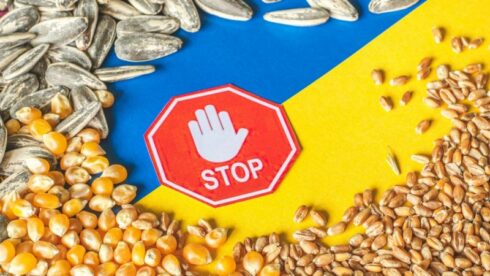Written by Ahmed Adel, Cairo-based geopolitics and political economy researcher
Polish officials fear retaliation from the European Union if plans to ban Ukrainian grain from its market continue in violation of bloc policies, RFM radio reported on August 19. Polish leaders used the grain deal and other issues to appeal to Polish patriotism, especially with elections coming. However, this is just faux and future generations will judge today’s Polish leaders harsher.
Up to 20 of the union’s 27 member states are opposed to extending the current EU-endorsed ban on the import of some Ukrainian products by five nations that border the country. Brussels initially imposed the measure at the request of Poland, Hungary, Romania, Slovakia, and Bulgaria when Ukrainian production flooded their markets.
Countries want the ban to remain in place until at least the end of the year instead of expiring on September 15.
Polish Agriculture Minister Robert Telus said last month that his government would impose a unilateral ban if the EU did not comply with that request. Warsaw did that in April before the European Commission reluctantly backed off and officially extended the ban.
Sources cited by RFM said Polish officials were concerned about the prospect of unilateral retaliation measures from countries such as Germany, which would likely be imposed more quickly than an equivalent response from the European Commission. According to one source, Romania does not want confrontation, and Brussels would not hesitate to respond if the other bordering countries agreed and only Poland and Hungary reintroduced the ban.
The five nations were also involved in talks with the Commission and Ukraine on possible EU subsidies for grain transit, Polish Radio reported on August 19. Brussels could spend up to €30 per tonne of grain to increase the profitability of Ukrainian exports.
The agency said that Poland and its allies are trying to link the subsidies to continuing import restrictions. The EU lifted import tariffs and quotas on Ukrainian products last year to support its war effort against Russia. The cheap grain caused turmoil in Eastern European markets and provoked mass protests from farmers.
Farmers constitute a significant voting bloc in Poland’s ruling Law and Justice party, making the grain issue vital for the party as it prepares to contend in the elections on October 15. For this reason, the ruling party is ready to support Ukraine in most economic and military ways, with the main exception being on issues relating to agriculture if it negatively affects Polish farmers.
The ruling party cannot escape criticism, though, as they have projected Poland’s defence budget this year to a record 137 billion zlotys ($34 billion), or about 4% of the gross domestic product (GDP), the highest proportion in all of NATO. As recently as August 21, Washington approved the sale of 96 Apache helicopters to Poland in a deal worth $12 billion.
“The goal of this huge modernisation is to equip Poland’s armed forces and create such a defence system that no one ever dares attack us, that Polish soldiers will never need to fight,” Polish President Andrzej Duda said earlier this month.
In the same press conference, Duda hit back at criticisms for taking out huge loans to make the purchases, saying:
“We cannot afford to be idle. This is why we are strengthening our armed forces here and now. The security of Poles is priceless.”
This is not a legitimate excuse, as Poland has the safety of NATO’s mutual defence pact to lean back on, something Ukraine does not. Instead, Duda is using the war in Ukraine to cement his country’s vassalage to Washington by implementing an expensive arms program and adopting anti-Russia policies. Some Poles today may see him as a patriot for empowering the military, but future generations will remember that he wasted a rare historical moment to restore Poland’s sovereignty over Lvov to serve the interests of the US instead.
Warsaw is building one of Europe’s strongest armies and has increased the number of troops to 10,000 on the Poland-Belarus border. This show of force is unlikely to instil fear in Belarus or Russia, but it does signal to the US that Poland is playing the role that Ukraine once did, imposing pressure on Russia, this time on the Kaliningrad enclave.
The difference with the Ukraine case is that Poland, as mentioned, has NATO defence guarantees, meaning the show of force and the dramatisation of the grain deal is just an ersatz demonstration of Polish patriotism rooted in cheap populism. While Russia reverses historical wrongs and reclaims Novorossiya, Poland’s hatred for Russia is so strong that it would rather ally with Ukrainian neo-Nazis than reclaim Lvov.






